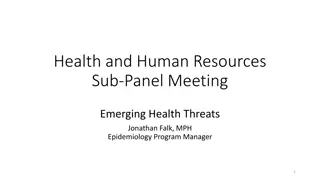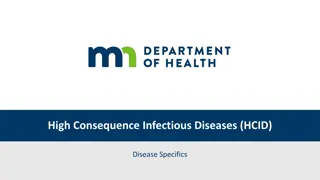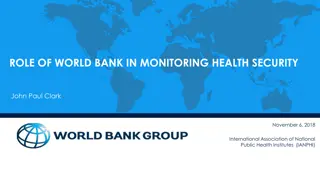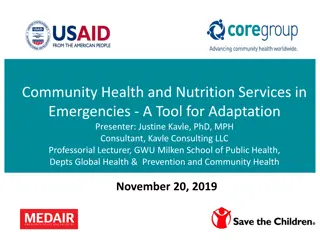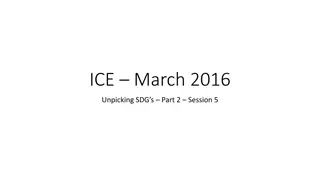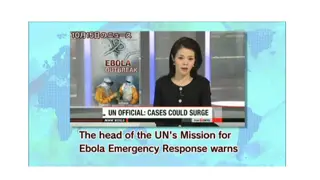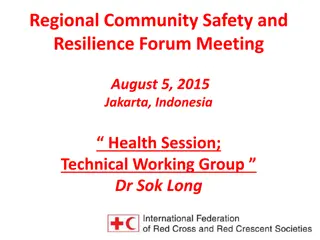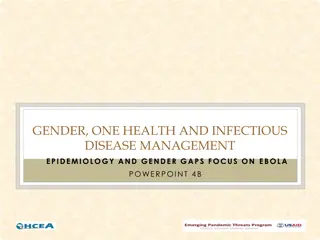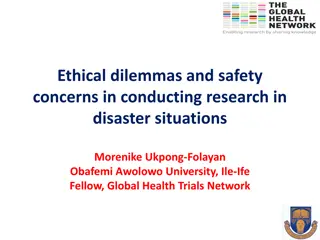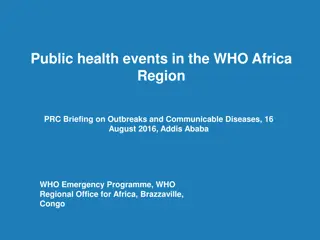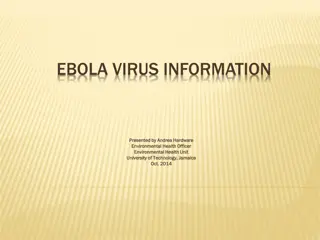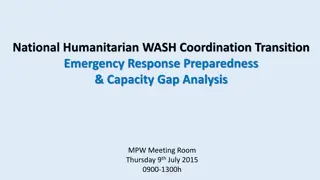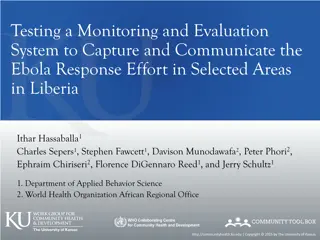Emerging Health Threats: Ebola, Measles, and Acute Flaccid Myelitis Updates
The Democratic Republic of the Congo faced its 10th Ebola outbreak in 2018, with 608 reported cases. Measles cases in the U.S. surged between 2009-2014 due to lack of vaccination, while Acute Flaccid Myelitis causes muscle weakness. These health threats are significant and require attention to preve
3 views • 24 slides
Understanding High Consequence Infectious Diseases (HCID)
High Consequence Infectious Diseases (HCID) encompass serious illnesses like Middle East Respiratory Syndrome (MERS), Ebola Virus Disease (EVD), and more. Patient screening for symptoms is crucial, and HCID is defined as diseases with high mortality rates and potential risks to healthcare personnel.
0 views • 70 slides
World Bank's Role in Monitoring Health Security and Financing Frameworks
The World Bank plays a significant role in monitoring health security through various analytical frameworks and tools, focusing on strengthening health systems post-Ebola. It has developed financing mechanisms like IDA Emergency Financing and PEF to support preparedness programs in response to healt
2 views • 6 slides
Community Health and Nutrition Services in Emergencies - Framework for Adaptation
This presentation by Justine Kavle discusses the CHSD Framework Tool designed to plan and adapt community-based health and nutrition interventions for emergency settings. It emphasizes tools for action planning, best practices, and evidence-based approaches to strengthen programs in both humanitaria
2 views • 21 slides
Global Health Challenges and Opportunities in the 21st Century
Unpacking the Sustainable Development Goals (SDGs), this content touches on important thresholds in global health, the impact of redefined priorities, the progress made since the MDGs, the rising burden of non-communicable diseases, lessons learned from the Ebola crisis, and challenges posed by urba
0 views • 14 slides
UN's Warning: Ebola Infections Could Surge to 10,000 Per Week by December
The head of the UN's Mission for Ebola Emergency Response is warning that the outbreak of Ebola could see a significant increase in new infections, potentially reaching 10,000 per week by early December. Urgent measures, including isolating infected individuals and safe burials, are vital to prevent
0 views • 15 slides
Sierra Leone Government's Risk Communication and Community Engagement Updates
Sierra Leone's government is actively engaged in community outreach and awareness efforts regarding COVID-19 and Ebola, including stakeholder meetings, radio discussions, and addressing trending rumors to dispel misinformation. Activities range from sensitization campaigns to waste management facili
1 views • 8 slides
Establishing the National Public Health Institute of Liberia (NPHIL)
In Liberia, the Ebola Virus Disease (EVD) outbreak emphasized the need for a resilient health system. The EVD crisis severely impacted the economy and public health, leading to the creation of the NPHIL to prevent and control future health threats. Through strategic planning and key pillars, the NPH
0 views • 13 slides
G7 Ise-Shima Summit Outcomes on UHC and Health Security
Highlights from the G7 Ise-Shima Summit in 2016 include a commitment to strengthen response to public health emergencies, promoting Universal Health Coverage (UHC), and reinforcing the global health architecture. The leaders emphasized learning from past crises like Ebola, enhancing preparedness, an
0 views • 8 slides
Regional Community Safety and Resilience Forum Meeting Agenda August 5, 2015 Jakarta
The Regional Community Safety and Resilience Forum held a meeting in Jakarta on August 5, 2015, focusing on health-related topics. The agenda covered key issues in health, pandemic preparedness for MERS and Ebola, ECV roll out, CBHFA workshop, and future strategies for resilience. The forum highligh
0 views • 11 slides
Gender Dimensions in Ebola Epidemics: Epidemiology and Gender Gaps
This presentation focuses on the gender dimensions in the epidemiology of infectious diseases, with a special emphasis on Ebola outbreaks. It highlights the 1995 Ebola outbreak in DRC, transmission modes, differences in exposure rates between men and women, and the impact on health care workers. The
0 views • 11 slides
Ethical Dilemmas and Safety Concerns in Research during Health Disasters
Ethical dilemmas and safety concerns arise when conducting research in disaster situations like Ebola, Zika, H1N1, and SARS outbreaks. Lessons learnt include the need for global guidelines, involving local communities, and aligning research with cultural norms and practices.
0 views • 20 slides
Key Facts About Ebola Outbreak and U.S. Government Response
Ebola, a virus discovered in 1976, spreads through direct contact with infected body fluids. The current outbreak has a 50% fatality rate with no cure or vaccine available. The U.S. government agencies like USAID, CDC, NIH, HHS, FDA, and State Department are actively involved in providing support an
0 views • 6 slides
Public Health Events in WHO Africa Region: Outbreaks Overview
Public health events in the WHO Africa Region pose a significant threat to global health security, with frequent outbreaks of diseases like Ebola, Yellow Fever, Polio, and cholera. In 2015, 105 public health events were reported, the majority being infectious diseases. Ongoing outbreaks in Angola, D
2 views • 30 slides
Understanding Ebola Virus: Information and Prevention Measures
Ebola Virus, a rare and deadly disease caused by infection with one of the Ebola virus strains, can affect humans and nonhuman primates. The disease is primarily transmitted through bodily fluids, contaminated objects, and infected animals. Outbreaks have occurred in various countries, but to date,
0 views • 7 slides
Challenges and Institutional Needs in Humanitarian WASH Coordination
Lack of clarity in donor roles, structural fund limitations, weak advocacy, and poor political engagement are hindering WASH coordination efforts. Key institutional challenges include inadequate resources, mandate conflicts, and limited capacity at national and sub-national levels, impacting the Ebo
0 views • 22 slides
Testing Monitoring and Evaluation System for Ebola Response in Liberia
This study focuses on testing a monitoring and evaluation system to capture and communicate the Ebola response effort in Liberia. The research, conducted by a team of experts from various organizations, emphasizes the importance of effective monitoring and evaluation in public health crises like the
0 views • 25 slides
